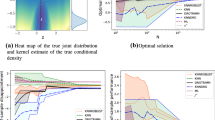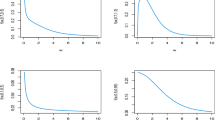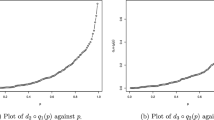Abstract
The outcomes of several real-life experiments arise in descending order. Dual generalized order statistics (DGOS) have been introduced as a unification of several models of descendingly ordered random variables like reversed ordered order statistics, lower k-records and lower Pfeifer records. The asymptotic theory (AT) proceeds by assuming that it is possible (in principle) to keep collecting additional data, so that the sample size grows infinitely. Under this assumption, many results can be obtained that are unavailable for samples of finite size. The AT is widely used in various statistical approaches, such as ordered random variables, time series models, estimation, testing hypotheses and so on. While the AT of DGOS from homogeneous population, i.e., all of the data points come from the same distribution, has been soundly investigated, no research has been devoted to this problem for heterogeneous population, i.e., the data points come from more than one distribution. This paper gives a closer look at the AT of DGOS based on data from a finite mixture of distributions normalized by the same continuous strictly monotonic sequence or a mixture of continuous strictly monotonic sequences.
Similar content being viewed by others
References
Alawady MA, Elsawah AM, Hu J, Qin H (2016) Asymptotic behavior of non-identical multivariate mixture. In: ProbStat Forum, July 2016, pp 95–104
AL-Hussaini EK, El-Adll EM (2004) Asymptotic distribution of normalized maximum under finite mixture models. Stat Probab Lett 70:109–117
Balkema AA, de Haan L (1972) On R. von Mises condition for the domain of attraction of \(\exp (-e^{-x})\). Ann Math Stat 43:1352–1354
Barakat HM (1997) Asymptotic properties of bivariate random extremes. J Stat Plann Inference 61:203–217
Barakat HM, Nigm EM (2002) Extreme order statistics under power normalization and random sample size. Kuwait J Sci Eng 29(1):27–41
Burkschat M, Cramer E, Kamps U (2003) Dual generalized order statistics. Metron 61(1):13–26
Elsawah AM (2014) Generalized order statistics under finite mixture models: asymptotic theory and applications. Lap Lambert Academic Publishing, Riga
Everitt BS, Hand DJ (1981) Finite mixture distribution. Chapman and Hall, London
Gnedenko BV (1943) Sur la distribution limite du terme maximum dune serie al eatoire. Ann Math 44:423–453
Gwak W, Goo H, Choi YH, Ahn JY (2016) Extreme value theory in mixture distributions and a statistical method to control the possible bias. J Korean Stat Soc 45:581–594
Kamps U (1995) A concept of generalized order statistics. Wiley, New York, pp 553–557 Teubner, Stuttgart. Update. 3
Leadbetter MR, Lindgren G, Rootzen H (1983) Extremes and related properties of random sequences and processes. Springer, New York
Lindsay BG (1995) Mixture models: theory, geometry and applications. The Institute of Mathematical Statistics, Hayward
Mohan NR, Ravi S (1992) Max domains of attraction of univariate and multivariate p-max stable laws. Theory Probab Appl 37:632–643
Maclachlan GJ, Basford KE (1988) Mixture models: applications to clustering. Marcel Dekker, New York
Nasri-Roudsari D (1996) Extreme value theory of generalized order statistics. J Stat Plann Inference 55:281–297
Nasri-Roudsari D (1999) Limit distributions of generalized order statistics under power normalization. Commun Stat Theory Methods 28(6):1379–1389
Nasri-Roudsari D, Cramer E (1999) On the convergence rates of extreme generalized order statistics. Extremes 2:421–447
Pantcheva E (1985) Limit theorems for extreme order statistics under nonlinear normalization. In: Lecture notes in mathematics, vol 1155. Springer, Heidelberg, pp 284–309
Smirnov, NV (1949, 1952) Limit distributions for the terms of a variational series. Original Russian in Trudy Math. Inst. Steklov. vol 25 (1949), pp 1–6
Sreehari M, Ravi S (2010) On extremes of mixture of distributions. Metrika 71:117–123
Titterington DM, Smith AFM, Makov UE (1985) Statistical analysis of finite mixture distributions. Wiley, New York
Acknowledgements
The authors greatly appreciate helpful suggestions of the referees and Prof. Debasis Kundu that significantly improved the paper. Elsawah also would like to thank Prof. Kai-Tai Fang for his guidance and kind support during this work. Elsawah’s work was partially supported by the UIC Grant (Nos. R201409, R201712 and R201810) and the Zhuhai Premier Discipline Grant.
Author information
Authors and Affiliations
Corresponding author
Rights and permissions
About this article
Cite this article
Elsawah, A.M., Essawe, F. & Zhao, H. Asymptotic Theory of Dual Generalized Order Statistics from Heterogeneous Population. J Indian Soc Probab Stat 19, 359–377 (2018). https://doi.org/10.1007/s41096-018-0049-9
Accepted:
Published:
Issue Date:
DOI: https://doi.org/10.1007/s41096-018-0049-9
Keywords
- Dual generalized order statistics
- Asymptotic theory
- Homogeneous population
- Heterogeneous population
- Normalization




